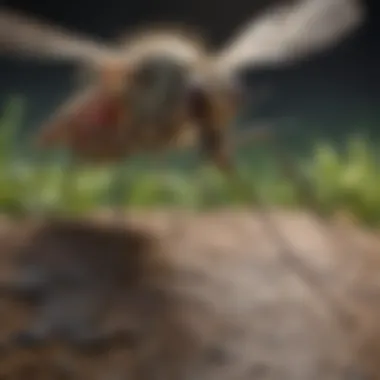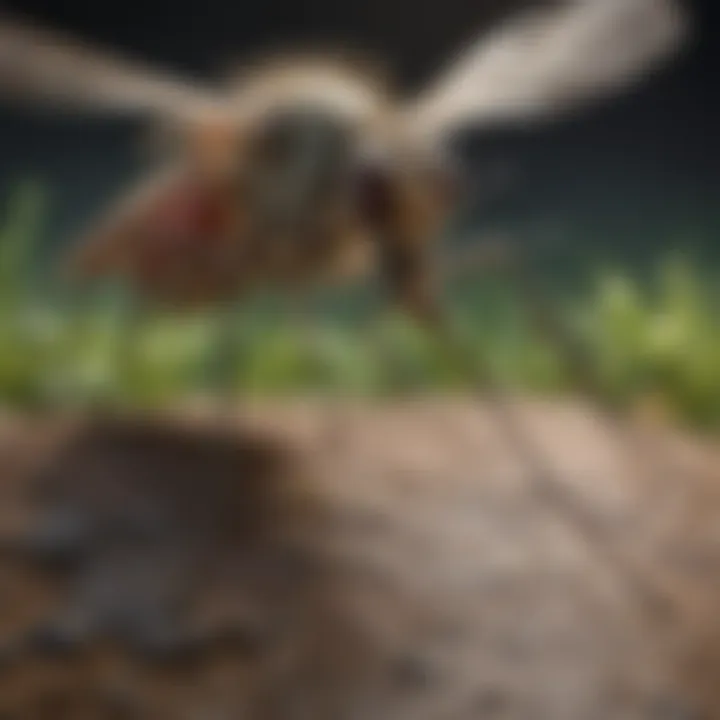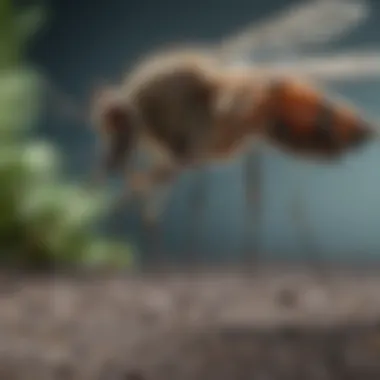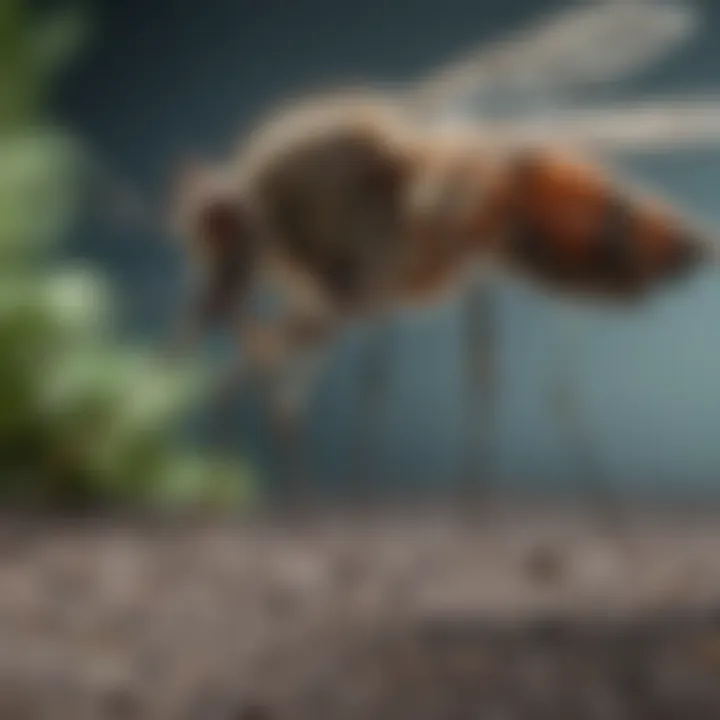Effective Mosquito Control Strategies in Memphis


Preventive Pest Control Strategies
House Exterior Protection
When it comes to keeping pesky mosquitoes at bay, starting at home is key. It’s important to inspect the exterior of your house and make sure no gaps or cracks are allowing these little nuisances easy access. Begin with a thorough check of window screens; any tears can invite more than just fresh air. Seal up cracks around windows and doors using caulk or weatherstripping. Another tip is to ensure all doors close securely - even the slightest ajar can be an invitation for these unwelcomed guests to set up camp.
Don’t forget about exterior lights, too; they can attract mosquitoes. Opt for yellow-tinted bulbs for porches or gardens. These lights tend to be less appealing to the pests.
Yard Maintenance
Your yard acts as a battleground when it comes to mosquito control. Regular yard maintenance not only enhances the beauty of your outdoor space but also discourages mosquitoes from turning it into a breeding ground.
- Essential yard care routines: Mow your lawn regularly to keep the grass low. Mosquitoes love tall grass, where they can hide from predators. Trim back shrubs and weeds where water can collect.
- Methods for keeping yard pest-free: Consider creating a buffer zone. Add plants that repel mosquitoes, such as lavender, marigolds, and citronella. These plants serve dual purposes, beautifying your space while ‘keeping the riffraff’ away.
Indoor Cleanliness
An organized indoor environment can diminish the risk of mosquitoes finding a cozy spot in your home. Maintaining cleanliness is essential, especially in warmer months. Here are some expert tips:
- Keep surfaces free of food debris. Crumbs can attract not only mosquitoes but also their friends - ants and flies. Ensure your kitchen is cleaning regularly.
- Store food in sealed containers to avoid enticing any hungry pests.
Moreover, maintain a dry environment. Mosquitoes thrive in dampness, so check for leaky pipes or areas where water may accumulate, then fix leaks and remove standing water.
Garbage Disposal
Garbage isn’t just unsightly; it can also be a feast for mosquitoes if not managed properly. Ensure your household trash is disposed of efficiently:
- Use garbage cans with tight-fitting lids to prevent odors from escaping.
- Create a routine for taking out the trash, ensuring it doesn’t pile up, which can attract insects.
Proper disposal isn’t just about cleanliness; it plays a key role in minimizing breeding sites for mosquitoes.
Other Pest Prevention Strategies
Employing innovative pest prevention strategies can make a great deal of difference in maintaining a mosquito-free environment:
- Water containers: Regularly empty, clean, or cover any containers that can collect water, such as buckets, flower pots, or pet dishes.
- Bird baths: While a lovely addition to your garden, they need to be maintained; change the water frequently to keep it fresh.
- Rain gutters: Keep these clear and unclogged, preventing water accumulation.
By knowing the proactive measures, you set the stage for a mosquito-free living space and help reduce the population right from your own home.
"Prevention is better than cure" - especially when dealing with the relentless mosquito.
Identifying Pest Risk Areas
Next, understanding where your home is at risk for an invasion of mosquitoes is crucial. A thorough inspection can point you toward threat areas.
Moisture Prone Areas Inspection
Damp conditions are a sanctuary for mosquitoes. Pay attention to areas like:
- Basements: Ensure proper drainage and ventilation.
- Windows: Check for condensation which might indicate leaks or humidity issues.
Keeping these areas dry not only helps you but also discourages pset presence.
Crack and Crevice Inspection Guide
Once you’ve tackled moisture-prone spots, take a closer look at cracks and crevices in your home. Often overlooked, these are prime access points.
- Access points: Look around doors, windows, and even inside your home for gaps that can be easily sealed up. A little caulk can go a long way in preventing unwelcome visits!
Greenery Inspection for Pest Risks
Your garden can play a significant role in mosquito control. Certain plants can harbor moisture. Here’s what to do:
- Regularly trim back plants to ensure they don’t bunch up, creating pockets of still, moist air.
- Maintain mulch to avoid over-soaking, which can attract mosquitoes.
Additional Pest Risk Areas
Consider inspecting outdoor furniture, toys, and equipment. These items often accumulate water - keep them dry and store them properly when not in use.
The more aware you are of potential risk areas, the better you can take proactive steps to safeguard your living space from mosquitos.
Prologue to Mosquito Control
Mosquito control isn't just about swatting the buzzing bothersome insects; it’s a multifaceted approach that plays a pivotal role in safeguarding public health and enhancing the quality of urban life in Memphis. Understanding the importance of effective strategies to control mosquitoes can have far-reaching consequences for families, particularly for those who spend considerable time outdoors.
Understanding the Importance of Mosquito Control
Mosquitoes are more than just nuisances; they are vectors for dangerous diseases like West Nile virus, Zika, and eastern equine encephalitis. Infestations can lead to increased transmission rates, putting vulnerable populations, such as children and the elderly, at higher risk. Thus, taking proactive measures can drastically reduce the incidence of these diseases, ensuring that Memphis residents enjoy their time outdoors with less risk.
Moreover, effective mosquito control can boost local economies. Hospitality, tourism, and outdoor recreational businesses benefit significantly when the threat of mosquito-borne illnesses is minimized. Homeowners can find their backyards more inviting, and families are more likely to engage in outdoor activities when they aren't constantly swatting away pests.
Ultimately, addressing mosquito issues at both individual and community levels leads to a safer and healthier environment. It's not simply about eliminating a temporary nuisance; it's about creating a sustainable solution that works for the long haul. Through education, strategic prevention, and community involvement, Memphis can collectively tackle the mosquito menace effectively.
Overview of Mosquito-borne Diseases
Mosquito-borne diseases are a serious health concern, affecting thousands each year. Here are some of the most notable diseases linked to these insects:
- West Nile Virus: Often asymptomatic, yet it can lead to serious neurological conditions in some individuals, resulting in long-term health complications.
- Zika Virus: Particularly dangerous for pregnant women, as it can cause serious birth defects in babies born to infected mothers.
- Dengue Fever: Known for its severe flu-like symptoms, this disease can escalate to dengue hemorrhagic fever, which can be fatal in severe cases.
In Memphis, outbreaks of these diseases can disrupt daily life. Public health officials face the constant challenge of educating residents about prevention. Ensuring that families understand the risks and actively participate in control measures is essential for community well-being.
"Awareness and education are the first steps in combating the threats posed by mosquitoes. By understanding how these diseases spread, we can take informed actions to protect ourselves and our loved ones."
Life Cycle of Mosquitoes
Understanding the life cycle of mosquitoes is paramount to effective control strategies. Each phase of their development presents a unique opportunity to mitigate their population. This in-depth knowledge informs tactics that homeowners and communities can implement to manage and drastically reduce mosquito presence. By familiarizing themselves with the life cycle, individuals can target specific stages and apply appropriate measures to disrupt breeding and survival patterns, ultimately leading to reduced nuisance and public health risks.
Egg Stage
The life cycle begins with the laying of eggs. Mosquito females usually lay their eggs in standing water or moist areas, often in clusters called rafts. Depending on the species, the eggs can hatch within a couple of days or endure prolonged drought before emerging.
Consider this stage as the crucial starting point for control measures. Eliminating standing water is vital at this point.
- Inspect receptacles around the home: Such as cans, flower pots, and bird baths.
- Change water in pet dishes or fountains regularly.
- Ensure gutters are clear to prevent water accumulation.
Addressing the egg stage is often more effective than waiting until mosquitoes are adults, as it can significantly prevent new populations from emerging.
Larval Stage
Once the eggs hatch, they enter the larval stage. Mosquito larvae are typically found swimming in water. They require water to thrive, residing mostly in stagnant pools, ponds, or other confined water bodies. During this stage, they feed on organic matter and microorganisms.
Here, the focus should shift to improving water management. Homeowners can:
- Introduce small fish, like guppies, that naturally feed on mosquito larvae.
- Apply larvicides to bodies of water that cannot be drained, targeting only this life stage without harming other wildlife.
Being proactive in this phase not only aids in interrupting the life cycle but also minimizes the risk of diseases carried by adult mosquitoes later.
Pupal Stage


The pupal stage is a transition period where larvae turn into pupae. They don't feed during this time and float on the water's surface, resting until they're ready to emerge as adults. The duration of this stage can vary, but it generally lasts a couple of days.
With this stage being the least active, it's crucial to turn our attention back to resource management to prevent larvae from entering this stage. The strategies from the larval phase carry over to this stage too,
- Keeping water sources circulating can deter pupae from settling.
- Orange cones can also disrupt the formation of pupal clusters to keep them from transforming into the more problematic adult mosquitoes.
Adult Stage
The adult mosquito emerges from the pupa and is ready to fly away in search of a blood meal, as female mosquitoes require nutrients for egg development. This stage presents the most direct threat to human health.
Control tactics during the adult stage need to be multi-faceted:
- Regularly apply repellents, especially during dusk hours when mosquitoes are most active.
- Use citronella candles or essential oils for outdoor gatherings to mask human scents.
- Consider installing screens on windows and doors to avoid indoor entries.
- Participating in community efforts for targeted insecticide programs can help reduce adult populations drastically.
Overall, tackling adult mosquitoes alongside the entirety of their life cycle leads to a comprehensive strategy for management.
"By addressing each stage of the mosquito life cycle, we can significantly reduce mosquito populations before they pose serious health risks to our communities."
Understanding the detailed phases of the mosquito life cycle is essential for devising practical strategies that not only alleviate the immediate nuisance but also safeguard public health from mosquito-borne diseases.
Environmental Factors Influencing Mosquito Populations
Mosquito populations do not grow in a vacuum; they are significantly impacted by various environmental aspects. Understanding these influential factors is not just a matter of academic interest but a fundamental prerequisite for effective mosquito control in Memphis. By shifting our focus to elements like weather patterns, urbanization, and water management practices, we can tap into strategies that enhance our defenses against these persistent pests.
Weather Patterns
Weather plays a pivotal role in determining mosquito populations. Temperature, humidity, and precipitation are key components that can either support or hinder mosquito life cycles. Warmer temperatures provide ideal breeding conditions, triggering faster development from egg to adult. It’s not uncommon to see mosquito numbers surge during and after rainfalls. Standing water becomes prime real estate for mosquitoes to lay their eggs, setting off a chain reaction of increased breeding.
- Temperature: Mosquitoes thrive in temperatures between 75°F and 85°F. When the mercury rises above this range, their activity may decrease, but their reproduction often accelerates under optimal conditions.
- Humidity: High humidity levels are essential for adult mosquitoes. Dry spells tend to limit their lifespan, while significant humidity acts like a protective umbrella over these pests.
- Precipitation: Rainfall is a double-edged sword. While it creates ponds and pools for mosquito breeding, prolonged wet conditions can also wash away eggs, depending on the intensity of storms.
With the climate exhibiting unpredictable patterns, it’s crucial for residents to keep a close eye on weather forecasts to adjust their mosquito control strategies effectively.
Urbanization and Land Use
Transforming landscapes in Memphis due largely to urbanization has profound implications for mosquito populations. As natural habitats are converted into urban settings, mosquitos find new niches where they are more beneficial and less harmful to themselves. This change is not merely aesthetic but functional, influencing drainage patterns and access to breeding grounds, ultimately supporting mosquito proliferation.
- Development of Green Spaces: Parks and gardens can provide both vegetative cover for adult mosquitoes and stagnant water bodies for breeding. Maintaining these spaces while ensuring proper drainage can significantly impact local mosquito dynamics.
- Construction Activities: When construction occurs, soil and debris may accumulate, creating conditions for water pooling. This inadvertently leads to ideal breeding conditions.
- Transportation Infrastructure: Roads and highways disrupt natural drainage. Water may accumulate in ditches along these routes, providing another site for egg-laying.
Water Management Practices
Water management practices are crucial and cannot be overlooked when tackling mosquito populations. How local communities handle water can make or break mosquito control efforts. This ties back to the notion of maintaining healthy environments, emphasizing the need for effective water management systems.
- Reducing Stagnant Water: Homeowners must regularly check for and eliminate any standing water in yards—this can be anything from neglected birdbaths to blocked gutters. Getting rid of standing water is a top priority.
- Proper Drainage Systems: Cities should invest in proper drainage infrastructure that prevents waterlogging. Efficient stormwater management can serve as a powerful weapon against mosquito breeding.
- Water Quality Control: Maintaining the quality of standing ponds is essential. Introducing predators such as fish can help manage mosquito larvae before they develop into adults.
Preventative Measures Against Mosquitoes
Mosquito control is not just a thing for designated pest control experts; homeowners and communities alike have a significant role to play in curbing these pests. Preventative measures, when carefully executed, can drastically reduce mosquito populations, limiting the spread of diseases they often carry. Not only does this protect public health, but it also enhances the quality of life in your neighborhood.
Understanding how to tackle mosquito breeding and feeding grounds can be your best defense against these tiny nuisances that menace outdoor activities.
Homeowner Strategies
Removing Standing Water
A fundamental tactic for mosquito prevention centers around removing standing water. Mosquitoes lay their eggs in still water, which means the less there is, the fewer of them you'll have buzzing around. This aspect is crucial in any mosquito control strategy. Whether it be your bird bath, clogged gutters, or unkempt plant pots, ensuring that water doesn't linger is pivotal.
- Key Feature: Efficiently eliminates potential breeding grounds.
- Beneficial Choice: This method stands out due to its simplicity and immediate impact on reducing mosquito numbers. No special skills are needed—just regular checks on your outdoor spaces.
However, it does require diligent effort. Forgetting to check your property frequently may lead to a surprising resurgence of these pests. By routinely inspecting and eliminating standing water, you're keeping the upper hand in your battle against mosquitoes.
Maintaining Gutters
Another significant measure involves maintaining gutters. When gutters overflow or clog, they create pools of water, providing prime conditions for mosquitoes to breed. Regular cleaning ensures that rainwater flows freely and does not accumulate in those hidden spots.
- Key Characteristic: Proper maintenance leads to effective water drainage.
- Popular Choice: Homeowners appreciate how they can prevent potential breeding sites easily by integrating gutter checks into seasonal home maintenance routines.
However, one must be cautious about seasonal changes. In autumn, leaves can wreak havoc on your gutter systems, necessitating more frequent inspections to avoid oversight. Not only does good gutter maintenance protect against mosquitoes, but it also preserves your home’s structural integrity over time.
Community-Based Initiatives
Organizing Cleanup Drives
On a broader level, community involvement is vital. Organizing cleanup drives can positively impact local mosquito populations. When neighborhoods gather to tidy up parks, common areas, and vacant lots, they eliminate debris that collects water and encourages mosquitoes to thrive.
- Key Characteristic: Promotes community bonding while tackling the pest problem.
- Beneficial Choice: These drives create awareness and foster a collective responsibility towards managing mosquito populations.
While these events are usually successful, a challenge arises in maintaining momentum. One cleanup won't cut it; sustained effort is essential to see lasting results. Yet, engaging community members empowers them, giving everyone a stake in maintaining a mosquito-free environment.
Public Awareness Campaigns
Additionally, public awareness campaigns serve as another avenue for mosquito control. By distributing flyers, hosting neighborhood meetings, and using social media platforms, communities can raise awareness about how mosquitoes breed and thrive.
- Key Characteristic: Utilizes collective knowledge to battle a shared concern.
- Popular Choice: Education campaigns tap into the brainpower of the community, inspiring direct action against mosquitoes.
The unique feature of these campaigns lies in the potential to change habits over time. Education isn’t instant, but awareness fosters a culture of vigilance. Communities that leverage knowledge typically find they face fewer mosquito-related problems.
Engaging homeowners and citizens is not only beneficial; it's vital to creating sustainable mosquito control solutions in Memphis.
Chemical Control Methods
Chemical control methods play a crucial role in managing mosquito populations in Memphis. With the rising number of mosquito-borne diseases, understanding the various insecticides available, their application methods, and the regulatory guidelines becomes vital for homeowners and local authorities alike. These methods can provide effective, immediate results when used correctly, but they also carry responsibilities and considerations that must be addressed to minimize any potential environmental impacts.
Insecticides and Their Application
Types of Insecticides
When it comes to mosquito control, the sheer variety of insecticides can be bewildering. Primarily, they fall into two categories: adulticides and larvicides.
- Adulticides are designed to kill adult mosquitoes on contact. They often provide quick relief in situations like outdoor events or gatherings. Active ingredients in this category include pyrethroids, which are synthetic versions of natural compounds found in chrysanthemum flowers. Their fast action makes them a popular choice. However, one must be wary of the potential development of resistance in mosquito populations over time.
- Larvicides, on the other hand, target the immature stages, preventing their growth into adults. Typically used in stagnant waters where mosquito larvae thrive, they are also advisable as a preventative measure during the wetter months. A common choice is Bacillus thuringiensis israelensis (Bti), a bacterium that can disrupt the development of larvae but is harmless to other wildlife.
This distinction is key, as employing both strategies can yield a more effective, long-term control plan.
Application Methods
The methods of applying these insecticides significantly influence their effectiveness and safety. Two prevalent techniques are aerial spraying and ground-based treatments.
- Aerial spraying involves dispersing insecticides from planes or drones, often covering large areas quickly. This method is particularly useful in emergency scenarios, like outbreaks, allowing for a swift reduction in mosquito populations. However, it requires precise calibration to prevent contamination of non-target organisms and ecosystems, which can be a drawback.
- Ground-based treatments, in contrast, offer more control and precision. These can be executed via sprayers or foggers and are generally performed in specific hotspots identified as high mosquito breeding areas. This method allows for targeted application and minimizes the risk of unintended exposure to humans and pets.
Choosing the right application method hinges on the specific context, available resources, and environmental concerns.
Regulatory Guidelines
Understanding the regulatory guidelines surrounding insecticide use is essential for compliance and safety. The Environmental Protection Agency (EPA) oversees the registration of pesticides, ensuring they are safe for public health and the environment. Local authorities often adapt these guidelines, taking into account community health needs and local ecosystems.


For instance:
- Users must ensure the insecticides selected are approved for use in residential areas before application.
- Using insecticides during optimal weather conditions helps maximize efficacy while minimizing drift, notably on windy days.
- Maintaining proper records of applications can safeguard future community health efforts and foster transparency.
These regulations create a framework for responsible mosquito management, aiming to strike a balance between effective control and ecological responsibility.
Effective mosquito control requires a thoughtful approach that considers the life cycle of mosquitoes, community health, and environmental stewardship.
In summary, chemical control methods are a vital piece of the mosquito management puzzle in Memphis. By recognizing the types of insecticides available, understanding appropriate application methods, and adhering to regulatory guidelines, homeowners can contribute positively to mosquito control efforts while protecting their families and the environment.
Biological Control Methods
Biological control methods present an intriguing avenue in tackling the persistent mosquito menace in Memphis. Unlike chemical control, which often comes with environmental risks and health concerns, biological methods leverage the natural ecosystem to reduce mosquito populations. This approach taps into the fundamental principle of nature — that everything exists within a web of relationships. By introducing or enhancing the roles of natural predators or other organisms, communities can foster a more sustainable solution to mosquito control. Here are some insights into this beneficial strategy.
Natural Predators
In nature, there is a complex interplay of species, where predators help maintain a balance within the ecosystem. Mosquitoes are no exception, serving as a food source for various predators.
Among the most effective natural predators are:
- Fish: Species like Gambusia affinis, often called mosquito fish, thrive in stagnant water and feast on mosquito larvae. Their presence can dramatically decrease larval numbers in ponds and water containers.
- Birds: Certain bird species, such as swallows and purple martins, enjoy snacking on adult mosquitoes. Encouraging these birds to habitat nearby can help keep adult mosquito numbers at bay.
- Bats: While they may be less common in urban settings, bats are voracious nocturnal predators of mosquitoes. Community education about bat houses could help attract these beneficial creatures.
Utilizing these natural predators highlights a low-impact method for mosquito control, fostering a healthier ecosystem while providing the necessary benefits of pest reduction.
"Nature doesn't hurry, yet everything is accomplished." - Lao Tzu
Use of Bacteria and Other Organisms
Introducing bacteria and other microorganisms into mosquito breeding sites is another innovative biological control method. The most notable in this realm is Bacillus thuringiensis israelensis (Bti), a bacteria that produces toxins specifically harmful to mosquito larvae. When these larvae ingest Bti, it disrupts their feeding and ultimately leads to death without affecting other aquatic life.
Some other organisms effective in this strategy include:
- Nematodes: These tiny worms are natural parasites of various insects, including mosquito larvae. When introduced to stagnant waters, they can effectively reduce growing mosquito populations.
- Fungi: Certain species of entomopathogenic fungi can infect and kill mosquitoes upon contact. This method may not only reduce populations but also work towards self-sustaining control mechanisms.
Implementing bacteria and other organisms not only provides a targeted approach to control mosquitoes, but also poses fewer risks to human health and the environment. This method is a step toward achieving integrated pest management, where the goal is to control mosquito populations sustainably while minimizing harm to other species.
Innovative Technologies in Mosquito Control
As Memphis battles with the perennial struggles posed by mosquitoes, innovative technologies have emerged as a beacon of hope. These advancements not only aim to reduce mosquito populations but also do so with greater precision, ensuring effectiveness while minimizing adverse impacts on the environment and non-target species. In a city where each summer brings a new wave of these pests, it’s paramount to leverage cutting-edge solutions that can make a significant difference.
Genetic Modification
Genetic modification might sound like something out of a sci-fi film, but in the realm of mosquito control, it potentially offers a game-changing strategy. Scientists are utilizing technologies like CRISPR to alter the DNA of mosquitoes, making them less capable of transmitting diseases such as West Nile Virus and Zika.
For instance, the introduction of genetically modified male mosquitoes can help control the overall population. These modified males mate with wild females, resulting in offspring that don’t survive to adulthood. The benefits are clear: it actively reduces the mosquito numbers without the heavy reliance on chemicals that can create ecological imbalances.
However, while the technology holds promising prospects, it also raises ethical considerations and ecological concerns. It is crucial for local governing bodies and the relevant health organizations to closely monitor the outcomes of such initiatives to ensure they don’t inadvertently disrupt local ecosystems.
New Traps and Monitoring Systems
When it comes to controlling mosquito populations, a well-thought-out trapping system can be invaluable. Recent advancements in mosquito traps not only lure these pests more effectively but also monitor populations in real-time. These traps can provide real-time data on mosquito presence, distribution, and even species identification.
Some noteworthy technologies include:
- CO2 traps: These traps mimic human respiration by releasing carbon dioxide, which attracts mosquitoes. They are particularly effective for adult capture.
- Smart traps: Equipped with sensors, these devices can transmit data to local health departments, aiding in quicker response times and targeted control measures.
- Baited traps: Utilizing specific lures enhances the trapping efficiency, helping to gather a more accurate representation of the mosquito population in a given area.
The integration of such traps into a broader mosquito control strategy allows for tailored responses based on real-time data. With accurate information at hand, public health officials can prioritize areas that require immediate action, thus optimizing resource allocation.
In Memphis, harnessing innovative technologies can mean the difference between stagnant approaches and proactive measures that significantly curtail mosquito populations.
As these methodologies continue to evolve, Memphis stands to benefit immensely by embracing these innovative tools. Public support, along with collaboration among citizens, scientists, and health officials, will be essential in utilizing these technologies effectively.
The Role of Public Health Agencies
Public health agencies play a pivotal role in the fight against mosquitoes, not just as nuisances but as vectors of serious diseases. Their active involvement is crucial for implementing and enforcing mosquito control strategies in Memphis, ensuring the safety and health of the community. These agencies coordinate various initiatives, working closely with local governments, non-profit organizations, and the general public. The cooperation among these entities leads to a multi-faceted approach tackling the mosquito outbreak from all angles, resulting in more effective strategies.
Coordination with Local Government
The necessity for public health agencies to coordinate with local government cannot be overstated. This partnership is essential for creating policies that are suitable for the community's specific needs and capacities. When local governments and public health organizations join forces, they can implement localized control programs tailored to Memphis's unique environmental and demographic factors.
- Funding Allocation: Local governments can provide necessary funding, which helps agencies conduct assessments, implement control methods, and engage in public awareness campaigns. The allocation of resources ensures that mosquito control measures are not just sporadic but sustainable over the long term.
- Regulatory Framework: Together, these entities can also establish regulations that govern pesticide use and habitat management. By setting clear guidelines, they can ensure that all interventions adhere to safety and environmental standards — a vital aspect in a densely populated area like Memphis.
- Community Support: Collaboration also fosters greater community involvement. When public health workers and local officials join hands, it signals to residents that mosquito control is a priority. This can lead to an increase in participation in community cleanup efforts, workshops, and outreach activities aimed at reducing standing water or other mosquito-friendly environments.
Overall, strong coordination between public health agencies and local governments in Memphis can lay the foundational blocks of a well-organized mosquito control strategy. This relationship enables efficient management, data sharing, and resource optimization to combat the issue effectively.
Effectiveness of Public Health Initiatives
Public health initiatives often serve as the backbone of mosquito control efforts, reflecting a systematic response to the challenges posed by mosquitoes. These programs, designed with careful consideration of local conditions and needs, have shown varying degrees of success across communities.
- Surveillance and Response: One crucial aspect is the establishment of robust surveillance systems. Agencies need to identify mosquito breeding sites, track population densities, and monitor disease transmission patterns. By collecting data, public health officials can make informed decisions and respond proactively to mosquito outbreaks.
- Educational Campaigns: Public health initiatives often include educational campaigns that help residents recognize the risks associated with mosquitoes. Informing homeowners about how to eliminate standing water can significantly reduce breeding grounds. When residents are aware of the connection between their actions and mosquito populations, they are more likely to engage in preventive measures.
- Community Engagement: Engaging the community is another highlight of effective public health initiatives. Programs that involve local residents not only foster a sense of ownership but also leverage local knowledge. Residents are often the first to notice changes in their environment, allowing for quicker responses to emerging challenges.
"Involving the community in health initiatives creates a shared responsibility, turning vulnerability into resilience."
- Implementation of Best Practices: Agencies implement best practices learned from successful initiatives elsewhere, adapting them to fit Memphis's context. This knowledge transfer can significantly enhance the effectiveness of control strategies. Learning what has worked in similar urban settings aids in minimizing trial and error.
In summary, public health initiatives in Memphis are multi-dimensional—each aspect reinforcing the effectiveness of the others. Through surveillance, community engagement, and education, these agencies provide a structured approach to managing mosquito populations. They are the linchpins in creating a safer, healthier environment, demonstrating the importance of their role in effective mosquito control.
Community Engagement and Education
Community engagement is more than just a buzzword; it’s a vital cornerstone in the effective management of mosquito populations in Memphis. By fostering a sense of collective responsibility, communities can significantly reduce the breeding grounds and nuisances that mosquitoes create. The symbiosis between public health agencies and the local population ensures that mosquito control is not merely a top-down enforcement but a collaborative effort that yields better results.
Importance of Community Involvement
When residents take an active role in mosquito control, the benefits become glaringly evident. Here are some significant aspects:
- Identification of Problem Areas: Locals can spot problem zones in their neighborhood, like stagnant water in poorly maintained yards or local parks.
- Shared Knowledge and Practices: Communities often hold knowledge that is specific to their experiences with mosquitoes. Sharing effective strategies encourages others to adopt them.
- Increased Compliance: When people feel part of the solution, compliance with initiatives—like proper waste disposal and routine checks for standing water—increases.
"Communities that engage proactively in mosquito control see fewer incidences of diseases like West Nile and Zika, leading to a healthier environment for everyone."
The challenges presented by mosquitoes are, at their heart, community challenges. Each neighborhood has its unique blend of environments that attract these pests. It stands to reason that local involvement can lead to bespoke solutions that address specific concerns. Involvement can also pave the way for social bonding, as residents working together on clean-up initiatives learn about each other and build trust within their neighborhoods.
Effective Communication Strategies
Clear and consistent communication is crucial for building a well-informed community. The sharing of relevant information about mosquito control can be enhanced through various channels:
- Social Media Platforms: Utilize local Facebook groups or community forums on Reddit to share tips, strategies, and alerts about mosquito outbreaks or spraying events.
- Community Workshops: Hosting workshops in neighborhood centers can foster face-to-face discussions about effective mosquito control measures while enhancing community bonds.
- Newsletters and Flyers: Simple, well-designed printed materials that educate homeowners about the biology of mosquitoes, their life cycles, and preventative actions can create more awareness.
Several successful initiatives rely on repetition and clarity. When residents understand the specific actions they can take, they are more likely to follow through. Building awareness about the ecological balance—such as promoting the presence of natural predators like bats and birds—can elicit a positive response towards cooperative efforts.
A focus on direct and friendly messaging—simple explanations about how stagnant water leads to mosquito breeding—will solidify the community’s role in mitigating this problem. The message needs to resonate well enough that people remember it long after they first see it. The collective action of individuals, driven by informed communication, creates a powerful deterrent against mosquito populations in Memphis.
Legislative Support for Mosquito Control Programs


Legislative support for mosquito control programs is vital in any successful strategy aimed at making cities like Memphis safer and healthier. Understanding this support is not merely a matter of securing funds but encompasses a broad spectrum of actions, including formulating effective policies, engaging with local governments, and ensuring proper regulation enforcement.
Mosquito management is not just a concern for individual households. It requires a unified front to combat the implications of these pests effectively. The role of legislation cannot be understated; it shapes everything from public health initiatives to funding for innovative mosquito control technologies. Without the proper support, even the best laid plans can fizzle out.
One of the primary ways in which legislation facilitates mosquito control is through regulatory frameworks. Such frameworks help guide municipalities in their efforts and provide a basis for actions taken to mitigate mosquito populations. This includes monitoring summer rains, managing breeding sites, and targeting high-risk areas, all of which hinge on definitive legal backing.
In addition, legislation can foster public-private partnerships aimed at mosquito control. When laws encourage collaboration between governments, businesses, and organizations, resources can be pooled efficiently to tackle the issue more aggressively. The administrative support ensures that all parties are on the same page, from funding to implementation strategies.
Moreover, a well-structured legislative approach can improve public awareness and compliance. With appropriate regulations in place, the community is more likely to actively participate in mosquito control efforts, whether it's through cleanup drives or adhering to regulations.
"Effective mosquito control is not just a matter of preference but a public health mandate—legislation ensures it gets taken seriously."
Key Policies and Regulations
Essential to the success of mosquito control programs are specific policies and regulations. These guidelines set the groundwork for how cities can effectively manage mosquito populations. Memphis needs policies that address several components, such as:
- Permits for pesticide applications: Local policies should clearly outline the process for pesticide usage, including necessary permits, the timing of applications, and the conditions under which treatments are administered.
- Regulations on water management: In Memphis, where standing water is a breeding ground for mosquitoes, regulations need to address water management practices that prevent stagnation.
- Public health ordinances: Clear ordinances can dictate household responsibilities, such as maintaining a mosquito-free yard, which empowers residents to act collectively.
Funding and Resource Allocation
Securing adequate funding is another crucial aspect of legislative support for mosquito control. Local governments often face challenges in ensuring that sufficient resources are available for their health initiatives. Here are several potential funding mechanisms:
- State and federal grants: These can provide substantial funds for local mosquito control initiatives. Memphis should actively pursue these opportunities to bolster their programs.
- Dedicated local budgets: Allocating specific funds within municipal budgets exclusively for mosquito control can ensure that resources are consistently available without competing for funds with other initiatives.
- Public-private partnerships: Engaging businesses or non-profit organizations to donate resources or funds can significantly enhance a city's capacity to respond to the mosquito threat.
In summary, legislative support is a firmly embedded cornerstone of an effective mosquito control program. It not only lays down essential policies and structuring funding but also engages the community, empowering local populations to take part in managing the issue together. With the proper regulatory frameworks and resource allocation, Memphis can make significant strides toward a healthier environment.
Challenges in Mosquito Control in Memphis
Mosquito control in Memphis encounters multifaceted challenges that complicate effective management efforts. Addressing these challenges is not only crucial for safeguarding public health but also for ensuring the comfort and quality of life for residents. Understanding the resilience of mosquito populations and tackling public perception and compliance issues provide a foundation for strategic planning in mosquito control.
Resilience of Mosquito Populations
Mosquitoes possess a remarkable resilience that enables them to thrive even in less-than-ideal conditions. This adaptability is partly due to their ability to breed rapidly, with some species capable of laying hundreds of eggs at once. Additionally, urban environments often provide ample breeding sites, especially in areas where stagnant water collects. This resilience means that even successful mosquito control efforts can be undermined if the underlying conditions that favor mosquito breeding are not adequately addressed.
- Rapid reproduction: Mosquitoes can go from egg to adult in a matter of days. This quick lifecycle makes it difficult to significantly reduce populations before new generations emerge.
- Resistance to chemicals: Many mosquito species have developed resistance to commonly used insecticides. This increases the need for continual adaptation of control methods to ensure effectiveness.
- Environmental adaptability: Mosquitoes can survive in a range of habitats, from marshy areas to urban drainage systems, making them hard to eliminate completely.
In light of these challenges, control programs must employ an integrated approach, mixing chemical, biological, and environmental strategies to keep mosquito populations at bay.
Public Perception and Compliance Issues
Public perception plays a vital role in the effectiveness of mosquito control initiatives. If the community is not fully on board, even the best-laid plans can suffer.
- Awareness and education: Many people underestimate the dangers posed by mosquitoes and may not recognize the importance of preventative measures. Education programs that highlight the risk of diseases, such as West Nile virus or Zika, can help shift mindsets.
- Engagement in initiatives: For a community to actively participate in control measures—like removing standing water—there must be a sense of shared responsibility. When the community sees the problem as a joint issue, participation increases, leading to better outcomes.
- Perceived ineffectiveness: Should residents feel that controls are ineffective or erratic, compliance with recommendations like using insect repellent or supporting communal cleanup efforts dwindles.
"Community engagement is not merely a supplementary tactic; it's an essential pillar for sustainable mosquito control efforts."
To bridge these gaps, regular communication from local health departments and community organizations is crucial. Transparency about what is being done and how individuals can help fosters trust and compliance.
By understanding both the resilience of mosquito populations and addressing public perception, Memphis can enhance its strategies for effective mosquito control. Emphasizing the need for adaptive methods while cultivating community support positions Memphis towards a brighter, pest-free future.
Success Stories and Case Studies
The importance of sharing success stories and case studies in mosquito control cannot be overstated. These narratives provide practical examples of what has worked, showcasing initiatives that others can emulate. By looking at the experiences of various cities, we not only gain insight into effective strategies but also gain motivation to tackle our own challenges in Memphis. Success stories can serve to foster a sense of community and collaboration, enhancing public awareness about the significance of mosquito control efforts.
Benefits of Learning from Success Stories:
- Inspiration: Seeing real-life examples often serves as a powerful motivator. It encourages communities to initiate their own programs.
- Learning from Mistakes: Understanding the setbacks faced by others allows for better planning, as we can adapt strategies accordingly.
- Adaptability: Models can often be tailored to fit specific local contexts. What worked in one city may need tweaks to thrive in another.
"Wisdom is the reward you get for a lifetime of listening when you'd have preferred to talk."
— Mark Twain
Successful Initiatives in Other Cities
Other cities have successfully implemented creative approaches to combat mosquito populations. For instance, in New Orleans, the local health department partnered with schools to engage students in a project-based learning approach. Students examined local water bodies where mosquitos breed and made presentations about how to safely manage them. This initiative not only raised awareness but also encouraged families to take preventive measures, cutting down mosquito populations significantly.
Another noteworthy example comes from San Antonio, Texas. There, city officials enacted a program where local residents could apply for grants to improve drainage in their neighborhoods. The residents actively participated in designing and implementing solutions, which greatly reduced stagnant water—ideal breeding grounds for mosquitoes. The results were evident; mosquito-borne disease cases dropped significantly.
Local Successes in Memphis
Returning home to Memphis, there are several promising initiatives that highlight local successes in mosquito control. One such initiative is the Memphis Water and Drainage division, which rolled out an educational campaign across neighborhoods, focusing on the importance of regular maintenance of ditches and drainage areas. They distributed pamphlets and worked with community leaders to spread the word. Over the last couple of years, reports indicate a noticeable drop in mosquito populations in those areas that actively engaged with this program.
Furthermore, local neighborhood groups have banded together for various cleanup efforts. By organizing biannual community cleanups, they have effectively minimized standing water sources. Residents actively participate in removing debris from ditches and draining any local spots that collect water. Peer-to-peer motivation coupled with a targeted outreach campaign has shown a marked effect, not only in reduced mosquito populations but in invigorating community spirit.
This mosaic of successful stories, both from afar and within Memphis, paints a compelling picture that effective mosquito control is achievable. By learning from the proven strategies and drawing in the community, we can develop our own toolkit to not only address the issue at hand but also unite people towards a common goal.
Future Directions in Mosquito Control
Understanding future directions in mosquito control is crucial, especially for Memphis, where the struggle with these pests is ongoing. As cities evolve, new challenges arise, demanding innovative solutions. Embracing new technologies and methodologies will not just address the current mosquito populations effectively, but also pave the way for sustainable practices that can adapt to changing environmental and socio-economic conditions. It’s about thinking ahead and being proactive rather than reactive.
Emerging Technologies and Methodologies
The landscape of mosquito control is evolving rapidly, driven by ingenuity and the demand for more effective solutions. Here are some noteworthy advancements:
- Genetic Engineering: This approach can involve modifying the genes of mosquitoes to reduce their population or render them incapable of transmitting diseases. For instance, Oxitec has developed genetically modified mosquitoes that die before reaching adulthood, significantly lowering populations without the need for chemicals.
- Biological Control Aids: The use of certain bacteria like Wolbachia can help control mosquito populations. When these bacteria infect mosquitoes, they can inhibit the transmission of viruses such as dengue fever or Zika.
- Smart Trap Technologies: Recent innovations in trapping systems leverage sensors and data analytics to identify hotspots of mosquito activity. By accurately capturing data on mosquito presence, communities can deploy intervention strategies where they’re most needed.
- Drones for Surveying and Treatment: Drones are being utilized to survey large areas for mosquito breeding sites and even deliver treatment to hard-to-reach locations. This method offers a twofold approach—monitoring and direct intervention—thus enhancing effectiveness.
Incorporating these technologies isn’t simply about keeping the narrative alive; it’s about fostering a holistic approach that aligns with public health needs and community involvement.
Enhanced Community Involvement
Community engagement can significantly boost the success of mosquito control initiatives. When locals contribute to the process, it cultivates a shared responsibility and a deeper understanding of the environmental dynamic at play.
- Neighborhood Clean-up Drives: Organizing clean-up efforts can greatly reduce breeding sites. It’s not just about cleaning; it’s about education on why standing water is a breeding ground.
- Workshops and Informational Sessions: Hold events that educate the community about mosquito life cycles and the importance of personal responsibility in prevention. Sharing knowledge equips homeowners with tools to combat this nuisance.
- Volunteer Monitoring Programs: Encourage residents to participate in monitoring local mosquito populations. Training volunteers to recognize breeding sites and reporting them can foster awareness and immediacy in action.
"Community engagement is not an optional add-on; it’s a vital pillar in the architecture of mosquito control strategy."
- Social Media Collaboration: Platforms like Facebook or local Reddit communities can serve as channels for sharing findings, tips, and resources, creating a community of informed citizens willing to collaborate on mosquito control initiatives.
In summary, through effective communication and active participation, the community can serve as a driving force for positive change. By harnessing emerging technologies alongside an engaged public, Memphis can forge a path toward a more successful and sustainable mosquito control strategy.
The End
In addressing the challenges posed by mosquito populations, this article offers a comprehensive roadmap towards effective control strategies in Memphis. The importance of concluding on the subject of mosquito control cannot be overstated. For home owners and communities alike, understanding not only the methods available but also the potential benefits they bring is crucial. A well-structured approach doesn't just reduce the irritating buzz of mosquitos; it also actively contributes to public health by mitigating the risks of diseases such as West Nile virus and Zika.
Summary of Key Points
As we peel back the layers on this complex issue, several key facets emerge:
- Life Cycle Awareness: Recognizing the stages from egg to adult can guide targeted interventions.
- Environmental Factors: Knowing how weather patterns and urbanization influence populations helps in tailored strategies.
- Community Engagement: Local involvement in initiatives fosters a shared responsibility and awareness of the issue.
- Chemical and Biological Methods: Utilizing a mix of strategies, including innovative technologies, ensures a holistic approach.
- Legislative Support: Policies and funding play a pivotal role in sustaining these control efforts over the long haul.
By closing the loop on these points, stakeholders can appreciate the breadth of strategies available and the significance of each element in the larger framework of mosquito control.
Call to Action for Stakeholders
There is an urgent need for stakeholders, including local government representatives, public health officials, and community leaders, to rally behind effective mosquito control strategies. It is not enough to sit back and hope for a reduction in mosquitos; active participation is required. Here are some important steps that can be taken:
- Increase Funding for Control Programs: Advocate for budget allocations that prioritize mosquito management initiatives.
- Engage the Community: Host workshops to educate homeowners about preventive measures and promote community cleanup events.
- Support Research and Innovation: Encourage the development of new technologies and biological controls that minimize pesticide use while maximizing impact.
- Collaborate with Health Agencies: Strengthen the partnership between public health and local authorities to ensure cohesive planning and execution of mosquito control efforts.
The call to action is clear: cooperation enhances efficacy. As Memphis continues to tackle its mosquito challenges, let every stakeholder take their role seriously and commit to making a difference.



